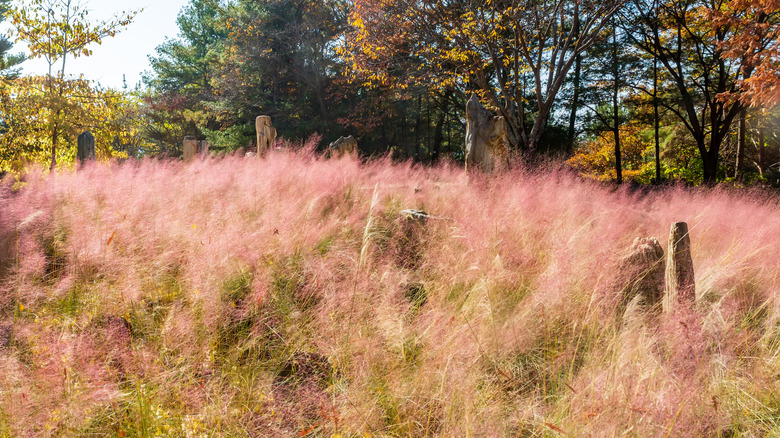Gorgeous landscape plants that are easy to grow and low maintenance are the best of both worlds. Say hello to Muhlenbergia capillaris, also known as pink hair grass or pink muhly. It is a perennial native to North America with thin green blades that sprout blush-colored plumes during the summer. As the season changes and leaves start to fall, this grass’ pink blossoms turn brown for a cozy autumn look.
The pink muhly is an eye-catcher growing up to 4 feet in height and a stunning, colorful ornamental grass to add to your landscape. It will pop against typically green lawns without overwhelming your garden aesthetic. Pink hair grass grows relatively fast and can even flourish in a flower pot. Don’t fear if your thumbs are far from green. You won’t find trouble planting this striking foliage, as it is adaptable and mainly self-sufficient. All you need is soil, sunlight, and water for the grass to be pinker on your side of the fence.
How to grow pink hair grass

Full sun and dry, well-drained soil are the ideal habitat for the pink muhly grass. At least six hours of direct sunlight will help produce the most vivid foliage and plumes, although this plant can survive in part shade or four hours of low-intensity sun. Your low-maintenance grass is not picky about its soil as long as it is well-drained — acidic, sandy, loamy, gravelly, and clay soil all work for its roots. This ornamental greenery thrives in USDA hardiness zones 5 to 11 and doesn’t need to be fertilized or pruned. Plus, pests and deer aren’t fond of the variety, so you won’t open a buffet for your local herbivores by planting it.
Pink hair grass is relatively easy to grow, especially since it is tolerant to harsh environmental conditions like poor air quality, dry soil, humidity, drought, and high salt concentration. While the colorful plant is drought-tolerant, it does need an occasional drink. During the seedling stage, its soil should be moist for the roots to take. Once the grass matures, it needs infrequent deep watering to drench 8 inches of soil. There are several ways to add these vibrant blades to your garden, whether in the backyard with companion plants or out front as decorative statement flowers.
Best way to add pink hair grass to your garden
Pink hair grass’ three-foot high blades tipped off in rosy blossoms can stand on its own, add it to your property’s border, along a walking path, or go wild with a colorful meadow. But, planting companion species nearby can boost soil health and disease resistance. Grasses like Pennsylvania sedge and little bluestem are companion plants that thrive with pink muhly and add calm greens to the vibrant foliage. You can also increase the flare with compatible flora. Pale coneflower, rough blazing star, and spotted beebalm have beautiful petals that liven your garden and don’t take away from the pink grass’ unique look.
Your ornamental blades are also steller as the thriller plant for your flower pot arrangements. Using the simple formula for a balanced container garden, let pink muhly be the showstopping thriller with plant species that flourish in similar conditions, like narrowleaf zinnia for your cascading spiller and woodland sunflower for the soil-hiding filler. You’ll have stunning planters with the low-maintenance grass to decorate inside and outside your home.